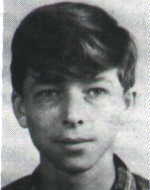Mantelik, David-Yitzhak (“Dudi”)
Son of Yosef HaCohen and Pnina. He was born on March 6, 1950 in Tel Aviv, the eighth generation in Israel, on his mother’s side. He studied at the Yehuda Maccabee Elementary School, completed his studies successfully, and received a certificate of appreciation for his work as an outstanding Toren in Natural Sciences. David had many talents and succeeded not only in his studies. During his short life he had had many hobbies that had occupied him since childhood. When he was ten years old, he built wooden boats and built engines for them, which he built with his own hands and by means of his invention. He is the devil in the Independence Garden pool surrounded by friends cheering for his success. Afterward, he entered the handicrafts department at the elementary school, where he received the grade “excellent” for sculpting a head that adorned the balcony of his home. During the vacations, he engaged in fishing in the Yarkon and various streams, which he traveled with his friends. He loved swimming in the sea, sailing, ping-pong and always came back from all his travels and activities. After graduating from elementary school, he moved to the municipal high school, where he was also very successful. His high school teacher wrote that “he was a quiet, self-contained, self-contained boy, with a wonderful mixture of seriousness and seriousness, with a touch of fine, gentle humor accompanied by a charming laugh. David was clearly and consistently gifted in his work, and his answers, both in writing and orally, were summarized in short and concise sentences, and despite his quietness lay a hesitant and questioning soul, It seems that something had stirred up within him, but that he avoided sharing his doubts and experiences with others. He did not spare time and effort to help them, but one area always lit a fire of enthusiasm within him and drove him out of his way. He shared the whole class with his hobby and caught up with his enthusiasm – David was a polite and gentle man, and he had respect for his friends and especially for his teachers and mentors. During the Six-Day War, at the age of sixteen and a half, he filled with his other friends his duty as a gendarme and during the pre-war tension in May, volunteering with his classmates to dig trenches in bomb shelters around Tel Aviv. During the six days, he and his friends from the Ministry of Defense received a certificate of appreciation for their active participation as gendarmes during the Six-Day War. When he was in the twelfth grade he applied for admission to the university, based on his academic achievements, and his parents rejoiced at his desire to learn and his thirst to add knowledge that he always claimed that he did not know enough. They asked him to come and enroll in the Faculty of Mathematics and Physics, but then David decided that first he had to fulfill his duty to the homeland and enlist in the IDF. His parents talked to him to change his mind, but all their pleas were in vain. He claimed, although he was not a militarist at all: “Until now I could live in Israel because of others who protected the state and Ali, and now it is my turn to protect others.” David was drafted into the IDF in February 1969 and assigned to the Artillery Corps, where he completed basic training as an outstanding trainee and was promoted to the IDF.In this course he was awarded a prize for his excellence – the release of guard duty on the Sabbath. It was the last Sabbath he had spent at home and his friends. On July 6, 1969, he died and all his hopes and dreams were left unfulfilled: he was brought to rest in the military cemetery in Kiryat Shaul, and his unit commander wrote to his parents in a letter of condolence: “We met David as a novice and a trainee in the courses and we appreciated his seriousness , The sharpness of his perception and his high achievements. David completed a technical-technical course with honors and was chosen by his commanders to serve as a guide, in recognition of his great willingness and friendly behavior. His death is a severe loss to his friends and commanders and we can cherish his memory. “On the first anniversary of his passing, his parents published a book in his memory entitled” The Remaining Chair. “
